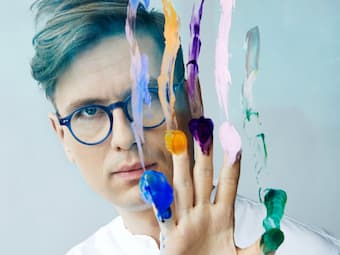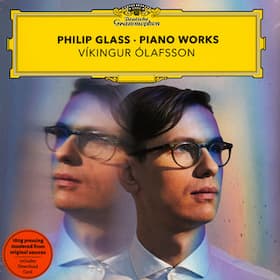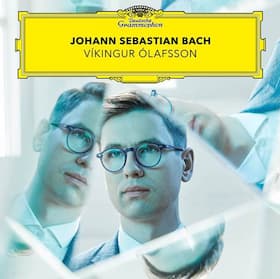
Víkingur Ólafsson © Ari Magg/Deutsche Grammophon
Born on 14 February 1984, Icelandic pianist Víkingur Ólafsson grew up in Reykjavík and started playing the piano at an early age under the tutelage of his mother, a piano teacher. He studied at the Juilliard School in New York, earning bachelor and master’s degrees under the supervision of Jerome Lowenthal and Robert McDonald, with additional instruction by Ann Schein. Within a few short years, Ólafsson made his mark with the release of three albums, Philip Glass Piano Works (2017), Johann Sebastian Bach (2018) and Debussy Rameau (2020) on Deutsche Grammophon. The Daily Telegraph called him “The new superstar of classical piano,” and The New York Times dubbed him “Iceland’s Glenn Gould.” Ólafsson has a natural ability to communicate both on and off stage, and he has brought a number of original projects to fruition. In 2020 alone, he has broadcast an eight-part series on Icelandic radio, presented his own primetime television series in Iceland called “Music Bites,” and created his own three part series on BBC Radio 3, “Transcribe, Transform.”
Víkingur Ólafsson arr. Bach’s “Widerstehe doch der Sünde,” BWV 54

Ólafsson: Philip Glass: Piano Works (2017)
In 2019 Víkingur Ólafsson won the BBC Music Magazine Recording of the Year with his recording of Bach piano transcriptions. A member of the jury writes, “From the opening seconds, it was clear that this was something exceptional: the programme both familiar yet unexpected, Ólafsson’s performance style delicately balancing fashions old and new, the recorded sound intimate and warm… It was the only disc we barely talked about. Because all eight of the jury were in agreement – Johann Sebastian Bach should go straight through to the next round, to be voted on by the public. Ólafsson clearly understood the risks he was taking, “People are so specific about what they want in Bach,” he explains “and often they’ve already formed very strong opinions. I thought that I’d get a little bit more hate because, you know, my Bach is my Bach…” Apparently, he spent many years forming his own ideas about Bach, “trying to make sense out of his structures and finding the right balance between freedom and discipline, between rubato and strict rhythm. And I tried, too, to play him in a three-dimensional way, giving life to the polyphony, like a theatre director controlling three or four characters at the same time. You have to make sure that they’re all alive, even when they have different roles.”
Mozart: Piano Concerto No. 24 in C minor (Víkingur Ólafsson)

Ólafsson: Johann Sebastian Bach (2018)
Ólafsson’s fascinating recording of Bach transcriptions is not a mere recital program, but rather a concept album. “I don’t want my albums to be merely an extension of my performing activity. I’m not one of those pianists who plays whatever they want to play in concerts for two years and then they record just because they’ve been playing it so much and want to document it. Albums should consider the listener rather than glorify the artist.” Ólafsson, of course, is also a major performing artist with residences at the world’s top concert halls, including the Konzerthaus Berlin, Brussels’s Flagey, and London’s Southbank Centre. And he has performed with the world’s greatest orchestras and conductors, including Bergen, Cleveland, San Franciso, New York, Salzburg and Los Angeles, under John Adams, Han-Na Chang, Bychkov, Manze, Järvi, and Dudamel, to name only a selected few.
Glass: Études, No. 6 (Víkingur Ólafsson)

© Ari Magg/Deutsche Grammophon
Víkingur has both absolute pitch and synesthesia, whereby he associates keys with certain colors. He credits pianist Emil Gilels with inspiring him to recreate orchestral texture and timbre on the piano, and for being able to produce a singing and rich piano tone. However, it was Martha Argerich who opened his ears to new colours and possibilities on the piano. “How she paints texture into the sound and gives rhapsodic shape to the rhythm, as well as those incredible octaves and pyrotechnics, still makes my jaw drop.” He frequently went to see Argerich in concert during his student days at Juilliard, buying seats right under the piano bench in the first row for her performances of the Shostakovich and Prokofiev 1st piano concertos under Rostropovich. “They didn’t agree on a single tempo it seemed, and I could sense her agitation, as I sat within touching distance. My heart was pounding throughout the performance. She more or less stormed off the stage afterwards and there was something dangerous and extraordinarily exciting in the air.” For Ólafsson, “Michelangeli is the pianist I look to more than any other in recent years, when it comes to matters relating to palette of colours, texture and, in some ways, directness of expression… This nobleness, this way of texturing the sound, this warm and inimitable way of building architectural structures in music is unparalleled.” Highly active in the contemporary music scene, Víkingur founded “Reykjavík Midsummer Music,” an annual chamber music festival held in Harpa, Reykjavík, and he succeeded Martin Fröst as the artistic director of Sweden’s Vinterfest in 2015. Always pushing the envelope, Víkingur Ólafsson has premiered six piano concertos by Icelandic composers, and taken part in collaborative and highly imaginative performances with Philip Glass. We look forward to his new and innovative projects.
For more of the best in classical music, sign up to our E-Newsletter
Víkingur Ólafsson arr. Rameau’s Les Boréades
